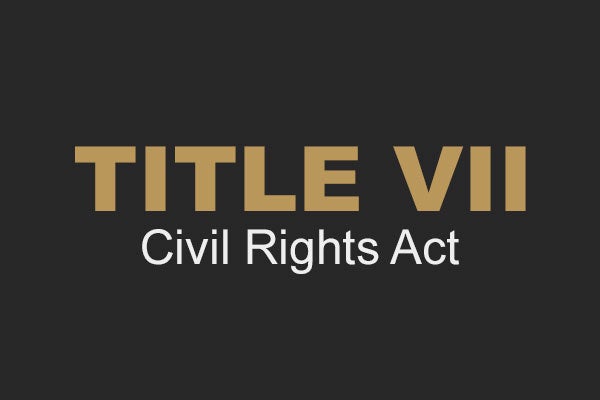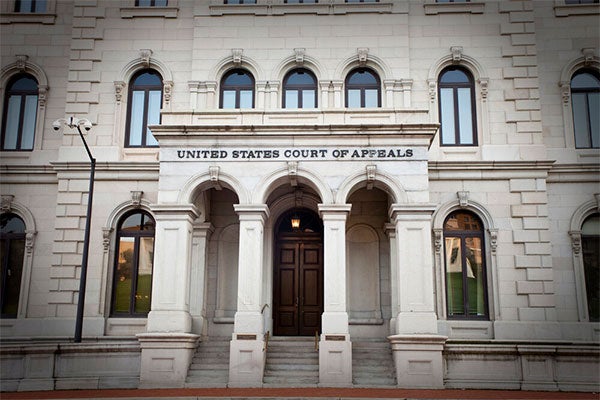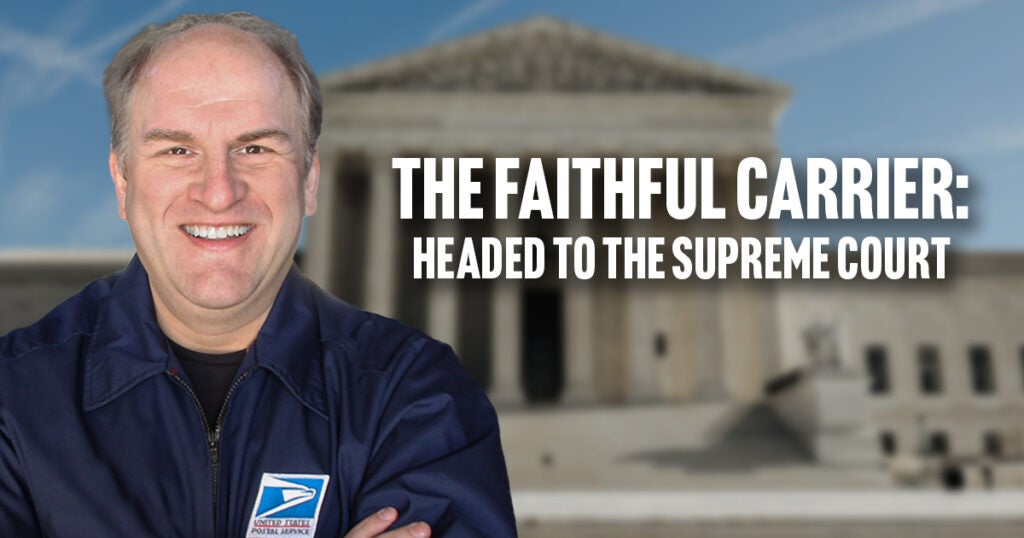Gerald Groff was forced to quit his job as a postal carrier because of his religious beliefs. The following timeline highlights the key moments in his journey. To read Gerald Groff’s full story, view press releases, and access legal documents, visit FirstLiberty.org/geraldgroff.

November 17, 2013
Amazon.com test-launches Sunday delivery in New York and Los Angeles, adding fifteen more cities nationwide by May of 2014, and aiming for Sunday delivery for a majority of the U.S. population by the end of 2014.

Late 2015 – August 2016
Sunday Amazon deliveries for postal employees begins to make its way into rural Lancaster County, Pennsylvania. The Postmaster at the Quarryville Post Office grants Groff an accommodation that exempts him from reporting for Sunday shifts. To help those who are scheduled in his place on the Lord’s Day, Groff picks up extra shifts and work where needed.

May 24, 2016
USPS and the National Rural Letter Carriers Association enter a “Memorandum of Understanding” agreeing to a process for scheduling employees for Sunday delivery. USPS commits to trying to find volunteers to work Sunday shifts and, if there are none, it would schedule part-time employees, substitute carriers, and RCAs. Groff’s Postmaster continues to exempt him from Sunday shifts.

August 20, 2016
Groff’s Postmaster revokes his accommodation, forcing Groff to choose between violating his beliefs about the Lord’s Day or seek employment opportunities elsewhere. In response to his Postmaster’s continued ultimatum to either work on the Lord’s Day or find other employment, Groff finds another solution. He sacrifices all of the seniority he had earned over the past four years at the Quarryville Post Office to transfer to a junior position at the nearby Holtwood Post Office. While it allows Groff to observe the Lord’s Day as a day of rest (for now) his transfer resets his ability to promote, secure medical benefits, receive vacation days, and obtain a pension from USPS.

March 19, 2017
Amazon Sunday delivery extends to the Holtwood Post Office. USPS management initially seeks volunteers to work overtime on Sunday, but so few postal carriers volunteer that junior postal carriers, like Groff, are enlisted to work their regular shifts and every Sunday on a rotating basis. Groff informs the Holtwood Postmaster that this conflicts with his religious observance.

April 5, 2017
Since Groff missed work to honor the Lord’s Day, USPS management summons Groff to the Lancaster Carrier Annex for the first stage in progressive discipline: a “Pre-Disciplinary Interview” (PDI). Groff brings his Bible to patiently explain the conflict Sunday delivery poses to his religious observance. He understands that many Christians see no conflict in Sunday work, but that his conscience commits him to honoring all of Sunday as the Lord’s Day, just as many in church history have done and several across Lancaster County still do.
USPS management offers Groff three options: (1) Groff may report to work after his morning worship service, (2) take a different day of the week as a way of keeping the Lord’s Day, or (3) management would attempt to find coverage for Groff when he was scheduled to work on a Sunday.
Groff explains that he believes the purpose of the Lord’s Day is to take the whole day (not just part) and any other day would preclude his ability to worship corporately with his church family—both key distinctives of his Christian beliefs. Management later describes its attempt to find others to cover Groff’s shift as “kind of arbitrary.”

May 10, 2017
USPS officials require Groff to report to the Lancaster Carrier Annex for his second PDI to, again, answer for his unexcused Sunday absences. He, again, explains his religious convictions and is met with hostile questioning about his religious beliefs by the Lancaster Sunday Amazon Supervisor. Another coworker volunteers to cover his Sunday shifts.

June 9, 2017
USPS escalates its discipline of Groff by issuing a “Letter of Warning,” charging him with “Unsatisfactory Attendance—Failure to be regular in Attendance.” Groff continues to request a religious accommodation and even seeks to transfer to another position that did not require Sunday work. USPS offers no additional accommodations and tells Groff that no non-career positions to which he could transfer exist.

July 3, 2017
In the face of increasing discipline by USPS, Groff keeps his commitment to honoring the Lord’s Day each Sunday. USPS officials again require his attendance at a third PDI. Again, he explains his religious convictions about honoring the Lord’s Day. The meeting ends with no discipline and no accommodation.
Meanwhile, the Holtwood Postmaster begins to question and belittle Groff’s religious beliefs. He suggests that Groff consult with his pastor to determine if Groff is wrong about his beliefs about the Lord’s Day since others were willing to work on Sundays. Further, the Holtwood Postmaster warns that USPS officials were losing patience with Groff and were considering “making an example” out of him. Groff begins to suffer physical consequences (losing sleep) from the stress and anxiety of the situation.

August 9, 2017
USPS calls a fourth PDI at which Groff is told that he had gained a “reputation” in postal circles for sticking to his religious convictions. As a result, USPS singles Groff out, requiring him to call in each week to formalize his absences. Groff humbly explains that he probably would not have begun employment with USPS if it had known his religious commitment could not be accommodated.

October 3, 2017
Another PDI requires Groff to drive again to the main Lancaster Carrier Annex where he again explains his religious convictions about the Lord’s Day. Groff makes clear that he desires to please his employer, but could not do so if that meant failing to honor God.

November-December 2017
RCA who had volunteered to cover Groff’s Sunday shifts suffers an injury that prevents her from continuing doing so. Coworkers indicate to Groff that their growing frustration is less directed at him and more at the postal management that requires them to work nearly every day. Groff continues to work every holiday that did not fall on a Sunday to help cover for those forced by USPS to work on Sunday.

January 2018
Groff makes a formal request for religious accommodation. USPS issues Groff a “7-day Paper Suspension” and makes clear that it is the next step toward termination.
The hostility toward Groff’s religious beliefs from the Holtwood Postmaster increases, including:
The stress from the increased hostility and ongoing, increasing discipline over his religious convictions causes Groff weight gain, chronic insomnia, hair loss, anxiety, and more. Because he lacked seniority, he had no coverage for the mental health services and treatment offered to more senior postal employees.

February 8, 2018
Groff attends a seventh PDI before the Holtwood Postmaster who had increased his hostility toward Groff.

July 2018
For at least a few weeks, USPS automatically schedules an additional RCA when Groff is scheduled on Sundays. This scheduling solution worked well for USPS. The Postmaster admitted that this caused no undue hardship on the business. But in July 2018, the Postmaster put a stop to what was an effective accommodation.

October 5, 2018
USPS issues Groff a “14-day Paper Suspension” for “Unsatisfactory Attendance,” citing his unavailability on Sunday. Groff’s Postmaster warns that USPS had lost patience with his religious convictions that prevent him from working on the Lord’s Day and that his termination could come at any moment. For the next few months, Groff’s daily work environment increased negatively as it became clear that USPS was unwilling to accommodate his religious beliefs.

May 1, 2019
Groff initiates lawsuit against USPS alleging that USPS violated Title VII’s requirement to accommodate his religious exercises, because doing so would not impose an undue hardship on the employer’s business.

April 6, 2021
The U.S. District Court for the Eastern District of Pennsylvania grants summary judgment in favor of USPS concluding that accommodating Groff’s religious exercise would constitute more than a “de minimus impact” on his coworkers.

May 25, 2022
A panel of the U.S. Court of Appeals for the Third Circuit affirms the district court’s decision. Judge Hardiman dissents, explaining that “Title VII requires USPS to show how Groff’s accommodation would harm its ‘business,’ not Groff’s coworkers.” Further, Judge Hardiman warned that the majority’s decision subjected Title VII’s mandate to accommodate religious employees “to a heckler’s veto by disgruntled employees.”

January 13, 2023
The Supreme Court of the United States grants review of Groff v. DeJoy on the two questions presented: